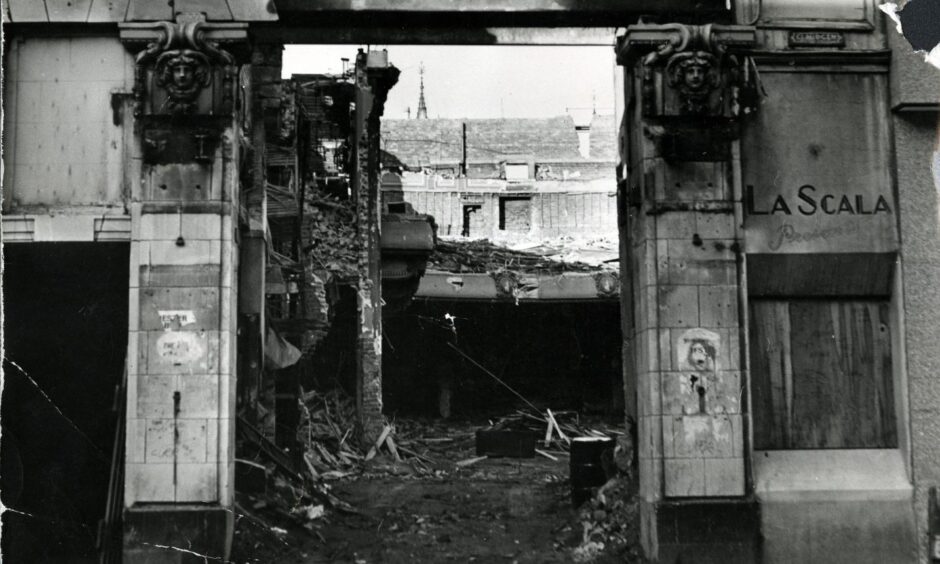
These haunting photos offer a final glimpse inside an icon from Dundee’s golden age of cinema.
In its day, the La Scala was recognised as the grandest cinema in Dundee.
The Murraygate cinema had a narrow façade that consisted of a large, square tower clad in white tiles and topped by a huge golden globe.
The decorative masks looked down on the rubble from a wall of tragedy when the spectacular building disappeared in the “Great Knockin’ Doon'” of the 1960s.
Had it survived, the La Scala might by now have been declared a listed building.
The La Scala was the first building to be constructed as a picture house in Dundee.
The cinema seated 1,099 and was designed by George Boswell of Glasgow and built with money put up by Ramsay Blair, who owned a chain of more than 20 cinemas.
The narrow frontage masked a large cinema with its own car park and there was seating downstairs and upstairs including “private boxes for four”.
The La Scala was opened on the December 9 1913 by Lord Provost Urquhart.
The first showing was the film Moths.
Dundee’s “premier cinema” promised “comfort, refinement and enjoyment” with “afternoon tea served gratis for patrons in the circle”.
An advertisement in 1913 suggested the “essence of enjoyment” was watching “the best films from the comfort of an armchair to the tune of an excellent orchestra”.
The screen was at the front of the building.
To get to their seats, patrons had to enter the auditorium at each side of the large screen at the front of the building and then walk away from it to reach their places.
It was said to be entertaining to watch the latecomers walking up the side aisles gazing over their shoulders, “and bumping gently off attendants, pillars, and one another”.
The La Scala showed continuous performances of films from 2.30pm to 10.30pm.
In the early silent days, the 18-piece La Scala orchestra was conducted by Mr Routledge Bell and became so famous they would even play concerts in their own right.
There was something magical about the silent movies in those days that transported people into mesmerising worlds of intrigue and romance, adventure and fantasy.
The orchestra was disbanded when the “talkies” were introduced in May 1930.
Three musicians used to play in the street every afternoon and would have their hat out at their regular pitch outside D.M. Brown’s department store in the Murraygate.
The hat bore the message: “Out of work due to the talking pictures”.
The La Scala was sold by the Globe Trust to independent cinema proprietor Harry Winocour in 1941 during an age when American films dominated British screens.
Credits rolled at Dundee cinema for last time in 1965
The La Scala could only get “second run films” and suffered from not being owned by one of the large cinema chains, which drew audiences away in their droves.
Hammer’s full-blooded horror films became popular at the La Scala and 60 years ago the cinema was showing Jerry Lewis in The Bell Boy and Elvis Presley in Blue Hawaii.
Generations of Dundonians were all shook up when the death knell sounded for the La Scala.
Memories of the beam of the La Scala projector surrounded by wreaths of cigarette smoke passed into Dundee history on May 1 1965 along with another city landmark.
At 8pm the last train left Dundee West Station for Glasgow.
The death warrant was signed by Dr Richard Beeching, chairman of the British Railways Board, who identified 2,363 stations and 5,000 miles of track for closure.
If you were courting, of course, you bought your companion some chocolates at the stall at the foot of the stairs.”
Three hours later the screen at the La Scala would darken for the final time.
The final film before the projectors rolled to a halt was Battle of the Spartans.
The La Scala was acquired by Woolworths, which used it as an extension to their present premises further along Murraygate, and succumbed to the wrecking ball.
In October 1968 an Evening Telegraph writer shared his memories of the La Scala after the bulldozers got to work during the demolition-happy days of the 1960s.
He said: “Like so many other vintage Dundonians, I often cast a nostalgic eye on what the demolishers have left of La Scala cinema.
“And I get to thinking of how often, many years ago, I planked down my 9d-for downstairs-or 1s 9d-for upstairs-all depending on the company for the evening.
“The downstairs approach was thereafter separated from that used by the bigger spenders – by a highly-polished, heavy brass rail.
“And the carpets were deep and the air held a sort of perfumed sweetness.
“If you were courting, of course, you bought your companion some chocolates at the stall at the foot of the stairs.
“And smiling-faced, rotund Freddy Crooks, the manager, would almost certainly be around to say “Good Evening” and “Hope you enjoy the film”.
“A silent, of course.
“The emergency gas jet at the top of the stairs always rather altered the trend of the atmosphere – but there was sweetness for the ear immediately once the inner doors were opened.
“For the orchestra would be playing with Henry Hollingsworth or Routledge Bell giving out on the violin.
“Then there was the sweet trumpet of Johnny Lynch to be savoured.
“The rhythmic drumming of Billy Wallace. The mellowness of Dave Phin’s cello.
“Sometimes a singer would be engaged when a special was shown.
“I recall marvelling at the voice of the girl who sang Smilin’ Through.
“You saw your pictures in comfort, too.
“With no interruptions by attendants peddling ice-cream and sweets and nuts and all the rest.
“An evening at ‘the Scala’ was something to be remembered.”
The La Scala was ‘hopelessly romantic’
Pamela Mulgrew, author of Let’s Go to the Pictures: Memories of Cinema in Dundee, said La Scala was “one of the most romantic cinemas in the city”.
“It had a very narrow façade on to Murraygate, which consisted of beautiful white tiles and the cinema was topped with a massive golden globe,” she said.
“This meant that La Scala really stood out and on a sunny day the rays were reflected like a cinema beacon to the passing shoppers.
“It was probably due to the brilliance of the orchestra that La Scala was the last cinema in the city to install a sound system when they moved to talking pictures.
“I find the whole premise of La Scala, with its romantic name and beautiful façade and orchestra, hopelessly romantic, although I might be alone in that thought.
“Many people who contacted me with their memories of La Scala for my book described it as dark and dingy and also the place to go to see the Hammer horror films.
“Maybe they are right, but surely a cinema that served up afternoon tea, a film and a famous orchestra must have been a real experience.”
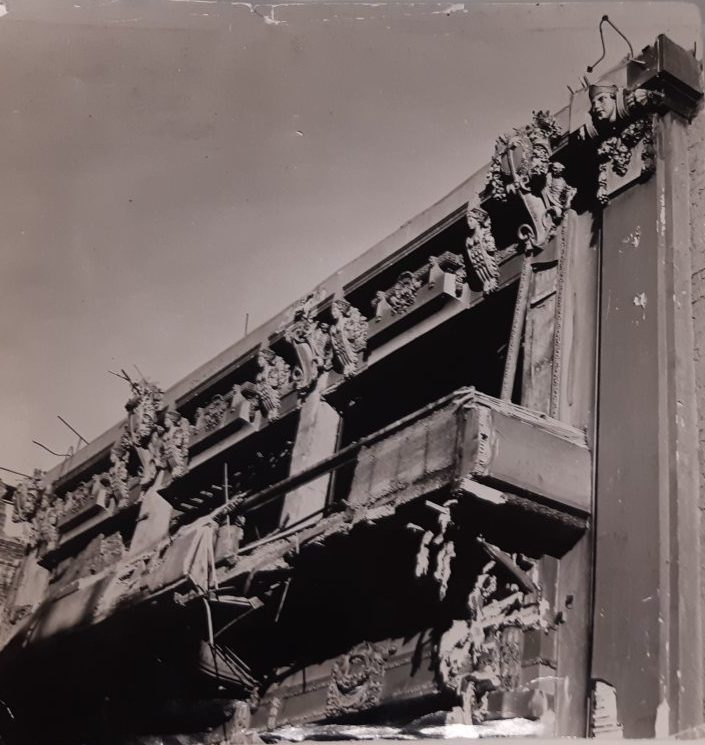
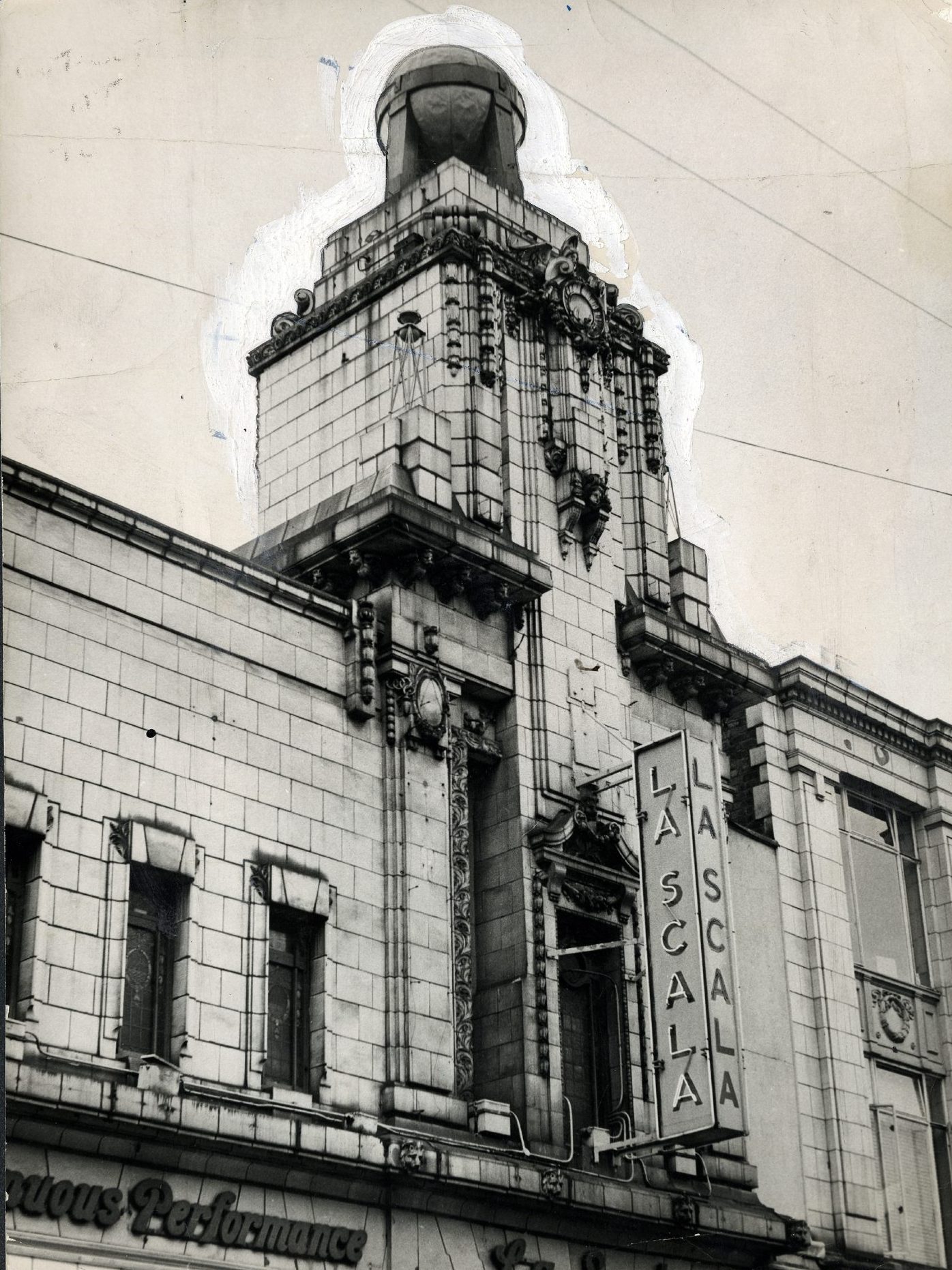
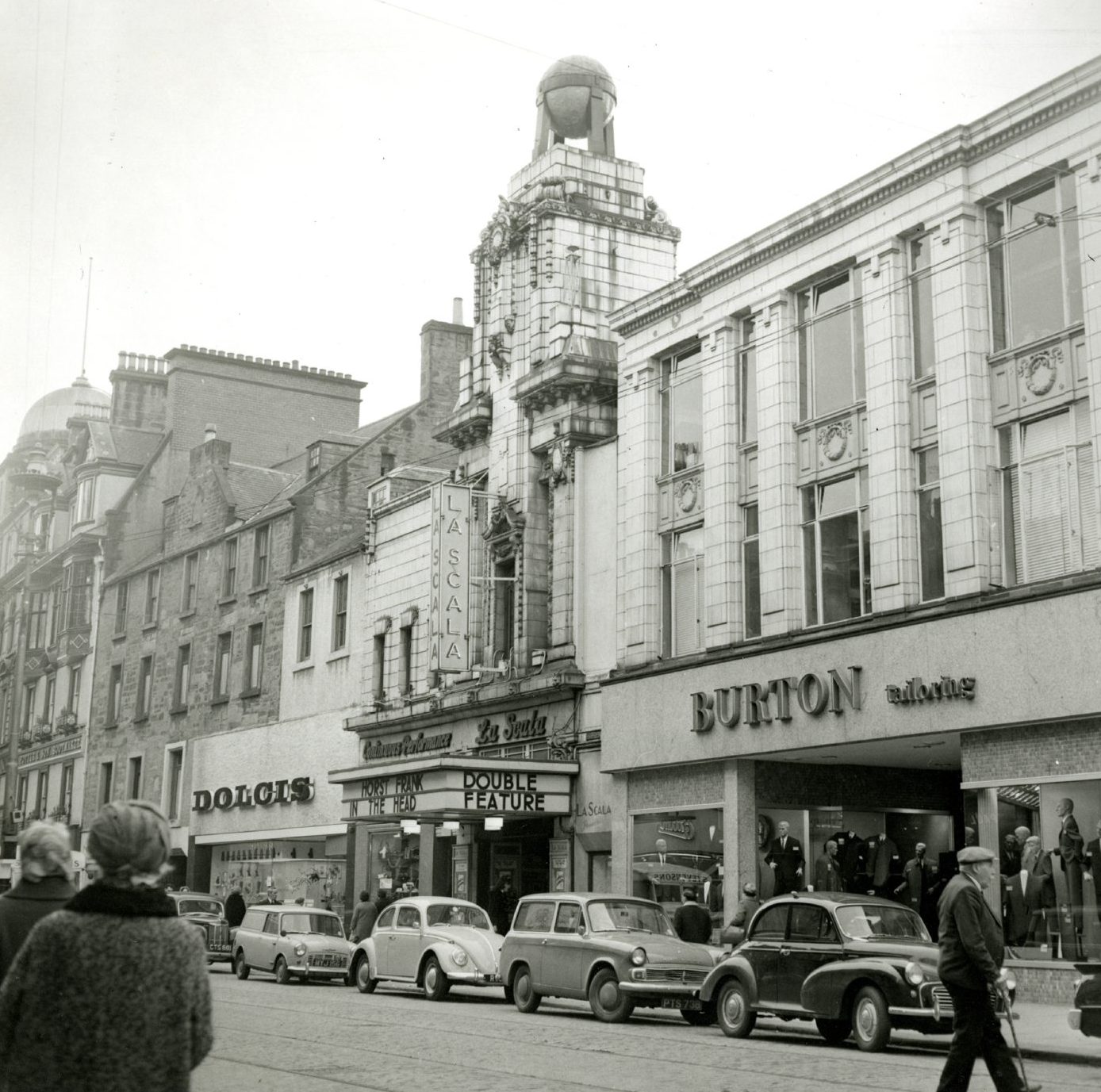
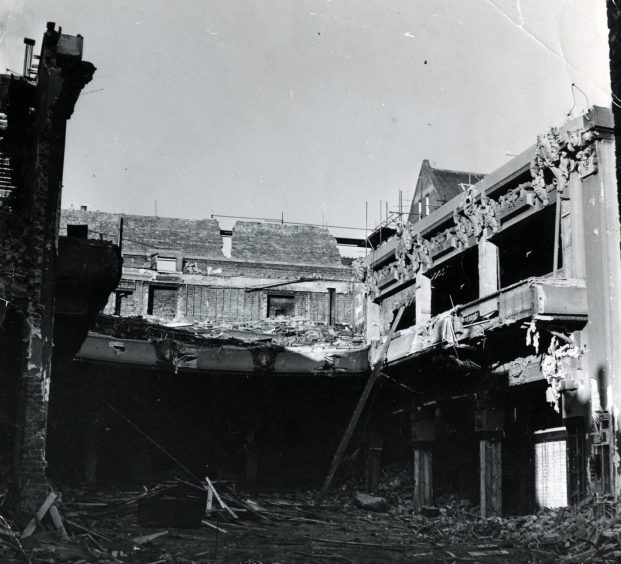
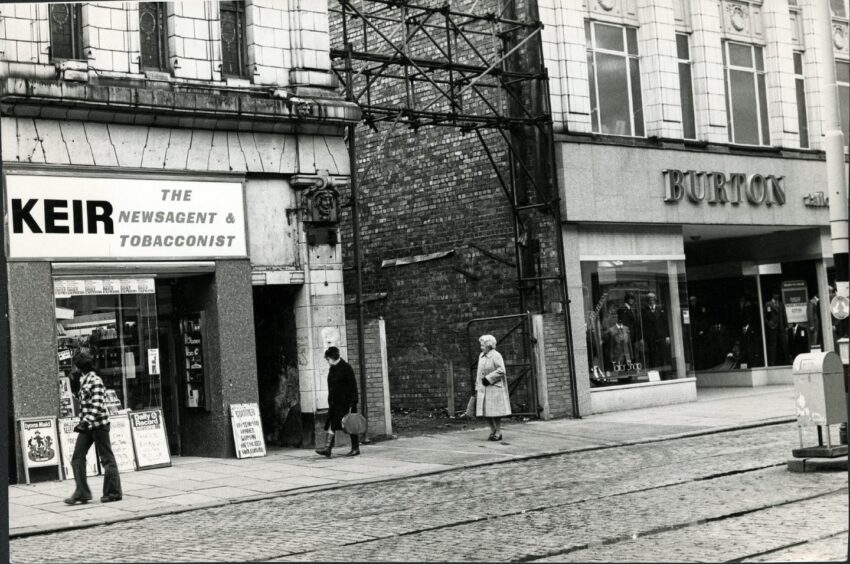
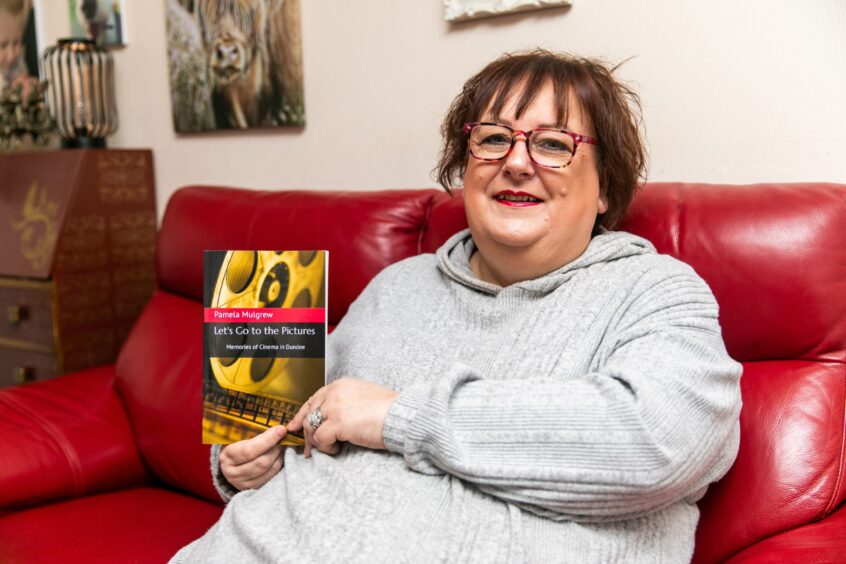
Conversation